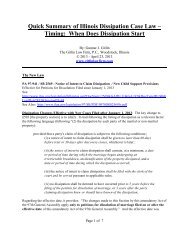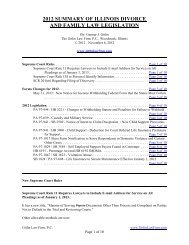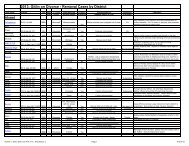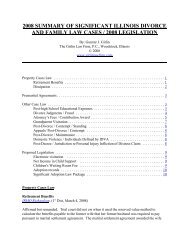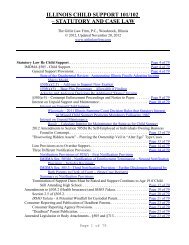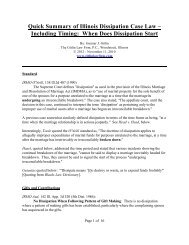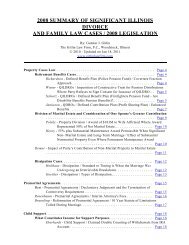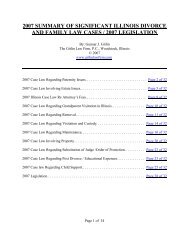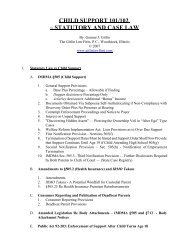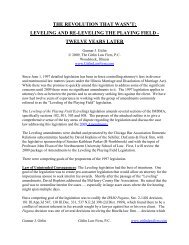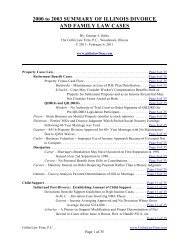Gitlin Law Firm 2010 Illinois Divorce and Paternity Case and ...
Gitlin Law Firm 2010 Illinois Divorce and Paternity Case and ...
Gitlin Law Firm 2010 Illinois Divorce and Paternity Case and ...
You also want an ePaper? Increase the reach of your titles
YUMPU automatically turns print PDFs into web optimized ePapers that Google loves.
Attorney’s Fees<br />
Interim Attorney Fees<br />
Radzik - Where No Affidavits or Affidavits Shown to be Outdated, Good Cause Shown for<br />
Evidentiary Hearing / IRA Exempt from Interim Fee Award<br />
IRMO Radzik, 2011 IL App (2d) 100374 (August 8, 2011)<br />
The husb<strong>and</strong> in this case was held in contempt for not liquidating his IRA to pay an interim fee<br />
award. He appealed <strong>and</strong> the appellate court reversed. After a lengthy expositions of the facts <strong>and</strong><br />
background the case analysis begins in earnest at paragraph 45 of the decision. The appellate court<br />
found that the trial court abused its discretion in its November 2009 interim fee order requiring the<br />
husb<strong>and</strong>'s IRA to be liquidated. The appellate court pointed out that the second petition for interim<br />
fees contained no affidavit from the petitioner or her attorneys:<br />
As noted above, section 501(c—1) specifically requires that at least one affidavit be<br />
attached because, while the proceeding may be nonevidentiary, proof may instead be<br />
provided via the required affidavits. In addition, the local rules required that the<br />
petition contain a current financial affidavit <strong>and</strong> that other updated financial<br />
documents be produced at the hearing. 19th Judicial Cir. Ct. R. 11.02.<br />
Arguably, however, the trial court considered the first <strong>and</strong> second interim fee petitions together. The<br />
appellate court, though stated:<br />
We acknowledge that the addendum to the petition purported to incorporate the first<br />
petition, filed five months earlier (although it did not attach that first petition or the<br />
February 2009 financial affidavit) <strong>and</strong> that the first petition for interim fees included<br />
petitioner’s financial affidavit <strong>and</strong> affidavits from petitioner’s attorneys. However,<br />
even if the court considered both petitions <strong>and</strong> their exhibits together, the evidence to<br />
support petitioner’s inability to pay <strong>and</strong> respondent’s ability to pay was lacking. The<br />
petition alleged only generally that petitioner could not pay <strong>and</strong> that respondent had a<br />
substantial income <strong>and</strong> was “well able” to pay. As to petitioner’s inability to pay, the<br />
financial affidavit was clearly outdated <strong>and</strong> inaccurate. *** In addition, <strong>and</strong> unlike<br />
the respondent in Rosenbaum-Golden, respondent here provided not just allegations,<br />
but evidence, in the form of eBay printouts, reflecting that petitioner’s financial<br />
affidavit was likely an inaccurate picture of her current financial status. *** At a<br />
minimum, we think that good cause was shown to hold an evidentiary hearing.<br />
However, the court abused its discretion in determining that petitioner established<br />
respondent’s ability to pay, because it received virtually no evidence regarding<br />
respondent’s present ability to pay the amount that the court awarded.<br />
An excellent discussion from the appellate court stated:<br />
In sum, we conclude that a court’s knowledge of the case can stretch only so far. The<br />
Act permits nonevidentiary, summary hearings on interim fee petitions, but it does<br />
<strong>Gitlin</strong> <strong>Law</strong> <strong>Firm</strong>, P.C.<br />
Page 24 of 49<br />
www.<strong>Gitlin</strong><strong>Law</strong><strong>Firm</strong>.com




